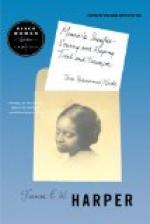While this conversation was going on, the tea bell rang, and Josiah and his little charge sat down to a well supplied table; for the Friends, though plain and economical, are no enemies to good living.
Anna had brought the high-chair in which their own darling had sat a few months before, when she had made gladness and sunshine around her parent’s path.
There was a tender light in the eye of the Quakeress as she dusted the chair, and sat Minnie at the table.
“Do you think,” said Thomas, addressing Josiah, “that we will ever outgrow this wicked, miserable prejudice?”
“Oh, yes, but it must be the work of time. Both races have their work to do. The colored man must outgrow his old condition of things, and thus create around him a new class of associations. This generation has known him as a being landless, poor, and ignorant. One of the most important things for him to do is to acquire land. He will never gain his full measure of strength until (like Anteus) he touches the earth. And I think here is the great fault, or misfortune of the race; they seem to me to readily accept their situation, and not to let their industrial aspirations rise high enough. I wish they had more of the earth hunger that characterizes the German, or the concentration of purpose which we see in the Jews.”
“I think,” said Thomas, “that the Jews and Negroes have one thing in common, and that is their power of endurance. They, like the negro, have lived upon an idea, and that is the hope of a deliverer yet to come; but I think this characteristic more strongly developed in the Jews than in the Negroes.”
“Doubtless it is, but their origin and history have been different. The Jews have a common ancestry and grand traditions, that have left alive their pride of race. ‘We have Abraham to our father,’ they said, when their necks were bowed beneath the Roman yoke.”
“But I do not think the negro can trace with certainty his origin back to any of the older civilizations, and here for more than two hundred years his history has been a record of blood and tears, of ignorance, degradation, and slavery. And when nominally free, prejudice has assigned him the lowest positions and the humblest situations. I have not much hope of their progress while they are enslaved in the South.”
“Well, Josiah, I have faith enough in the ultimate triumph of our principles to believe that slavery will bite the dust before long.”
“I don’t know, friend Carpenter; for the system is very strongly rooted and grounded in the institutions of the land, and has entrenched itself in the strongholds of Church and State, fashion, custom, and social life. And yet when I was in the South, I saw on every hand a growing differentiation towards the Government.”
“Do you know, Josiah, that I have more hope from the madness and folly of the South than I have from the wisdom and virtue of the North? I have read too ‘whom the gods would destroy they first make mad.’”




